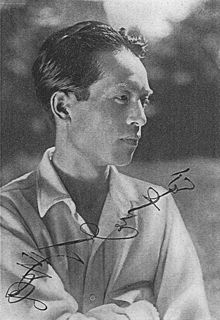- Daisuke Itō (film director)
-
Daisuke Itō
Daisuke Itō in 1928Born October 12, 1898
Uwajima, EhimeDied July 19, 1981 (aged 82) Nationality Japanese Occupation Film director, screenwriter Daisuke Itō (伊藤 大輔 Itō Daisuke, 12 October 1898 - 19 July 1981) was a Japanese film director and screenwriter who played a central role in the development of the modern jidaigeki and samurai cinema.
Contents
Career
Born in Ehime Prefecture, Itō joined the actors school at Shōchiku in 1920, but soon began writing screenplays under the recommendation of Kaoru Osanai.[1] He made his directorial debut in 1924 at Teikoku Kinema with Shuchū nikki.[1] After trying to start his own production company, he settled at Nikkatsu and established his name in 1927 with the three-part Chūji tabi nikki, which is considered one of the masterpieces of jidaigeki.[1]
Especially in the silent era, he was known for a very mobile camera style that earned him the nickname "Idō daisuki" (Loves Motion), which is a pun on his name. The heroes of his films, such as Tange Sazen and Kunisada Chūji, were often disaffected, nihilistic loners and thus Itō's early films were sometimes considered tendency films.[2] He was criticized, however, for being more of a stylist than a thematically committed filmmaker. While being a director who was less successful after the coming of sound, Itō worked with many great jidaigeki stars, especially Denjirō Ōkōchi, Yorozuya Kinnosuke, Raizō Ichikawa, and Tsumasaburō Bandō at studios such as Nikkatsu and Daiei, in a career that spanned nearly half a century.
In 1991, a partial print of Chūji tabi nikki, long considered a lost film, was discovered and screened for the public.[3]
Selected filmography
- Chōkon (長恨) (1926)
- Chūji tabi nikki (忠次旅日記) (1927)
- Shinpan Ōoka seidan (新版大岡政談) (1928)
- Chikemuri Takadanobaba (血煙高田馬場) (1929)
- Zanjin zanbaken (斬人斬馬剣) (1928)
- Jirokichi the Rat (御誂治郎吉格子 Oatsurae Jirōkichi kōshi ) (1931)
- Ōshō (王将) (1948)
- The Gay Masquerade (弁天小僧 Benten Kozō) (1958)
- Scar Yosaburo (切られ与三郎 Kirare Yosaburō) (1960)
- Hangyakuji (反逆児) (1961)
References
- ^ a b c "Itō Daisuke" (in Japanese). Nihon jinmei daijiten + Plus. Kōdansha. http://kotobank.jp/word/%E4%BC%8A%E8%97%A4%E5%A4%A7%E8%BC%94. Retrieved 9 January 2011.
- ^ Crow, Jonathan. "Daisuke Ito". All Movie Guide. http://www.allmovie.com/artist/daisuke-ito-95574. Retrieved 11 April 2010.
- ^ Richie, Donald (2005). A Hundred Years of Japanese Film (Rev. ed.). New York: Kodansha International. p. 69. ISBN 9784770029959.
External links
- Daisuke Itō at the Internet Movie Database
- Itō Daisuke at the Japanese Movie Database (Japanese)
Categories:- Japanese film directors
- Japanese screenwriters
- Samurai film directors
- 1898 births
- 1981 deaths
- People from Ehime Prefecture
- Silent film directors
Wikimedia Foundation. 2010.

